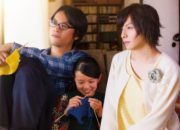
Japanese writer/director Naoko Ogigami’s latest movie is a delightfully sensitive family story that puts a refreshing slant on the continuing dialogue about the transgender community that is the focus of more and more films these days.
11-year-old Tomo (an enchanting and rather sanguine Rin Kakihara) has a single-parent mother who has a habit of suddenly taking off on a bender with a new man for months at a time leaving her young daughter to defend for herself. Tomo usually counts on her uncle Maiko (Kenta Kiritani) to take her in, and on this latest occasion he tells his niece that his girlfriend Rinka (Toma Ikuta) has now moved in with him and warns that she is ‘unusual’.
Rinka couldn’t be more welcoming and very generously goes out of her way to make their young guest as comfortable as possible giving her all the comforts of a home life that her wayward and self-centered mother never has. Tomo who had quickly realized what made Rinka ‘unusual’ is very guarded at first, but is soon won around by both her honesty and her openness and the genuine affection that quickly bonds the two. So much so that when one of her school class mates mother makes some nasty disparaging remarks about Rinka to Tomo, the young girl is so riled up in her defence that she physically attacks the woman.
It leads to a visit to Makio’s house of the Child Protection Services as it has now been reported that this is an unsafe environment for Toma to live in, a charge that is soon dismissed once the Inspector sums up the situation and talks to the child. Just as the talk starts of Rinka legalizing her own situation to be able to marry Makio and adopt Tomo, the roving mother turns up again alone and penniless. She refuses to accept that Rinka could have possibly been a surrogate as she angrily denounces her for not being a real woman, and once again Toma is joining Maiko rushing to her defence.
In a culture that is so homophobic as well as being transphobic, the raison d’etre is that even a mother who callously abandons her child on a whim is better than a loving trans woman who cares for her with unwavering love and genuine concern, and who treats Toma with the respect that is not often accorded to children. There is also a side strand to the story with Toma’s classmates roundly turning on any of their peers considered different and automatically taunted as faggots. And it’s the son of the very woman who had disparaged Renka to Toma who attempts to end his own life, after his mother has discovered he has homosexual feelings.
It is the sublime and subtly nuanced performance of Ikuta as Renka that really defines the whole piece. As a professional caregiver in a Seniors center with a natural talent for tending to everybody else’s needs and wants, Ikuta plays the part with stoic dignity and honesty that quietly embraces her natural status in life as the family homemaker and the central pivot that keeps this family of hers together. She portrays herself with naïveté expressed in her demure old-fashioned feminine wardrobe, but underneath has this wonderful fiery and determined spirit.
The title of the movie comes from the fact that Renka is a passionate knitter with a beautiful purpose which will help her make the final part of her transitioning complete.
Close Knits is a heart-warming piece that is full of so much joy and love despite the hostile negativity aimed at this unusual family, and it should be particularly applauded for showing the character of Renka as such a positive role model as a trans woman in a way that so very few movies ever do.

